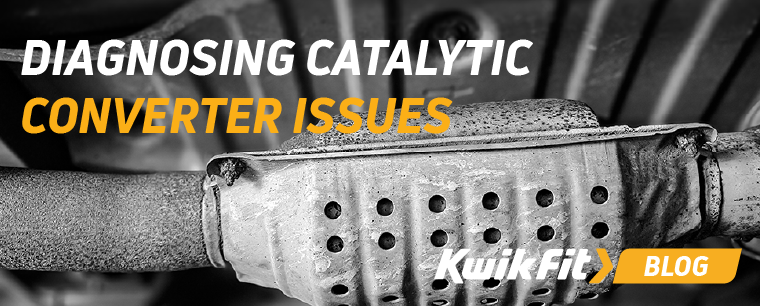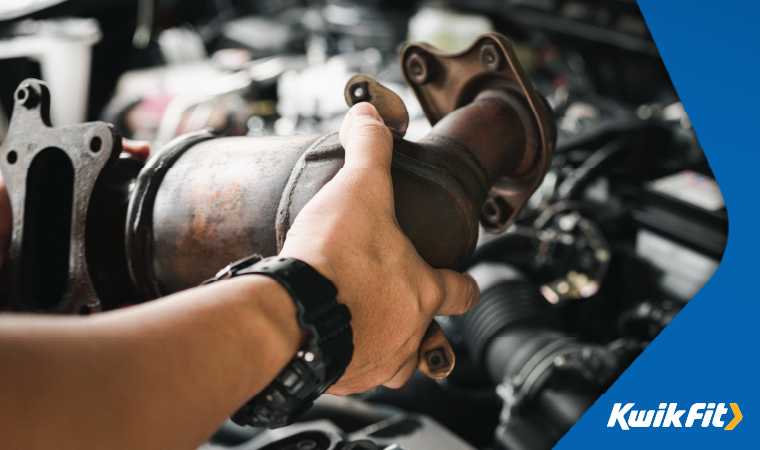Diagnosing Catalytic Converter Issues
Kwik Fit | Sunday 5th January 2025 10:05am

The catalytic converter is an essential part of your car as it prevents the air from being flooded with the pollutants and toxic gases produced by your exhaust. You might not have heard of a catalytic converter before but if youíve got a petrol car thatís been manufactured after 1993, your car likely has one.
Your exhaust creates emissions like hydrocarbons, carbon monoxide, and nitrogen oxide, which are harmful and damaging to the atmosphere. The catalytic converter reduces the total amount of these pollutants. It does this by converting them into water vapour and gases which are less harmful, by catalysing a redox reaction (an oxidation and a reduction reaction).
Looking to learn a bit more about catalytic converters? Our catalytic converters page is full of information about how they work and what they do. Alternatively, keep reading here to find out more about how important these bits of kit are and how to tell when you may need a new one.
What happens if I donít get a catalytic converter replacement?
Rather than looking at the technical side of how catalytic converters work, let's consider the impact that a damaged converter can have on your car in order to recognise the value it has when itís working smoothly.
In the event that your catalytic converter is damaged and you donít replace or repair it, it can have a negative effect on how your car performs.
In the early stages of breakdown, the converter does not immediately affect the engine of your car. However, the longer it is left without being repaired, the more damage occurs to the engine ó to the point that it will deteriorate significantly in performance.
This, in turn, also affects the exhaust, as it becomes blocked which impairs your carís functionality significantly. Catalytic converter issues also mean that, while your car is running, there is an increase in harmful exhaust emissions which are dangerous to the atmosphere. A damaged converter can also lead to your engine shutting down entirely if left without repair or replacement.

Signs that you need a catalytic converter replacement
While having to replace parts of your car can be bothersome, replacing your catalytic converter is certainly cheaper than having to pay for a new car. One of the best ways to prevent any lasting damage is to identify any issues with your catalytic converter as soon as they happen. Some of the main symptoms of an ineffective converter are:
- Slow engine performance
- Reduced acceleration range
- Additional heat from under your car
- The smell of rotten eggs or sulfur coming from your exhaust
- Dark smoke coming from your exhaust
These symptoms can be the result of other issues; however, you should take your car to be checked as soon as possible so that the cause can be diagnosed. By ensuring that your car undergoes regular maintenance checks and servicing, you can reduce the chance of any issues falling under the radar.
Diagnosis issues with catalytic converters
Itís important to note that diagnosing issues with catalytic converters can be tricky as many symptoms overlap with other parts of the car. Misleading check engine light codes can indicate that it is the catalytic converter, but problems may stem from upstream issues, such as faulty oxygen sensors, exhaust leaks, or engine misfires. Exhaust leaks or engine misfires can cause unusual exhaust smells, and these misfires can damage the catalytic converter, creating a cycle of issues.
How to tell when it's the catalytic converter causing problems
To confirm that the catalytic converter is the issue, check for trouble codes (e.g., P0420), compare sensor readings, and test for temperature differences or high back pressure using diagnostic tools. Eliminate other causes, such as faulty sensors, exhaust leaks, or engine misfires, to ensure the problem lies with the converter itself.
Kwik Fit's Services
At Kwik Fit, we offer a variety of vehicle servicing options to ensure that your car is running smoothly and getting you where you need to be.
If you have spotted any of the previously mentioned symptoms of catalytic converter damage, or if you are concerned about the performance of your catalytic converter, please visit your local Kwik Fit centre for a free exhaust check. With over 600 garages around the UK, your local Kwik Fit centre is only around the corner. Contact us today.
Any facts, figures and prices shown in our blog articles are correct at time of publication.
Featured Articles
Is it Illegal to Drive With One Headlight?
Saturday 19th July 2025
Wondering if itís illegal to drive with one headlight? Learn about the safety risks and penalties of illegal blown bulbs and why you should fix them promptly.
Air Con in EVs & Hybrids: Experts Answer Your Questions
Monday 30th June 2025
Does air con drain EV batteries? Can you use the air con while charging an electric car? Find out the answers to these questions & more from Kwik Fitís experts.
Why Is Your Car Making a Noise? Fixes & Tips
Friday 13th June 2025
When your car starts making unexpected noises, it can certainly be quite disconcerting; it may be nothing to worry about, but hereís what you need to know.









